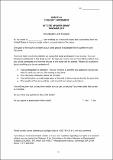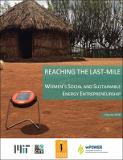Last-Mile Clean Energy Entrepreneurship Evaluation in Tanzania
Background: Solar Sister is a social enterprise that recruits and trains women to sell solar lanterns in their local communities. Currently, Solar Sister has 2,500 Solar Sister Entrepreneurs spread across Uganda, Tanzania, and Nigeria, with hopes to double that number by 2020. In 2013, CITE conducted its first evaluation in Uganda with Solar Sister. In 2017, Solar Sister was awarded a $750,000 grant from the Partnership on Women's Entrepreneurship in Renewables (wPOWER), a joint project of the U.S. Department of State and the United States Agency for International Development (USAID), to expand its operations and improve climate change mitigation in rural communities. Under this grant, CITE took on the role of Solar Sister's impact partner, conducting a study to build the evidence base for women's clean energy entrepreneurship in developing contexts. About the Study: Two main objectives drove CITE's research, which was carried out in Tanzania over the summer of 2017. The first objective was to assess the degree to which Solar Sister reaches last-mile customers; the second was to understand the sales channel characteristics that rural residents prefer. The study finds that Solar Sister reaches a wide variety of customers, including last-mile households, working in communities where solar lantern availability via other organizations or market outlets remain limited. Furhter, while some analysis suggests a gender bias against women entrepreneurs, the study also finds that rural residents place significant importance on in-person after-sales assistance from salespeople with whom they are familiar. Such characteristics are consistent with Solar Sister's emphasis on nurturing local entrepreneurs. This study and partnership built upon and complemented CITE's sustainability research, which aimed to elucidate the various contextual, interdependent factors that either encourage or prohibit technology diffusion and adoption. CITE welcomed the opportunity to not only deepen its relationship with Solar Sister through this work, but to also provide new insights regarding the role of women as facilitators of clean energy. In contexts where state-provided grid electricity remains scarce and unliklely to expand in the foreseeable future, the need for evidence on the efficacy and appropriateness of alternative delivery models for energy—especially clean energy—is needed to better understand what works where, and why. The main findings are reviewed in a summary report, while a more detailed discussion of the study's methodology and findings can be found in the full report.

